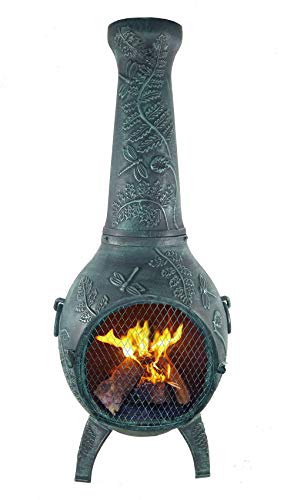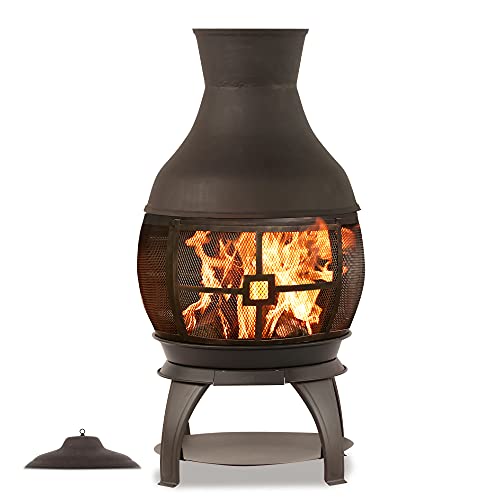What's The Current Job Market For Ceramic Chiminea Professionals Like?
페이지 정보

본문
 The Basics of a ceramic chiminea (have a peek at this website)
The Basics of a ceramic chiminea (have a peek at this website)Clay is the most common material used in the making of chimineas. Think of terracotta ware or red pottery. Clay is extremely strong and hard, but it is also susceptible to cracking when handled improperly.
Clay is highly absorbent, which is why it has to be protected by sand or gravel at the bottom of a chiminea along with logs or kindling. This stops the clay from burning too hot and seals hairline cracks.
Materials
Traditional clay chimineas are sometimes called pot-bellied ovens, come with a chimney that directs smoke into the air. These types of chimineas are usually coated to protect them from weathering and cracking due to sudden temperature changes. They are still susceptible to sunlight and rain. It is therefore essential to cover them when not in use to stop water puddles developing inside the clay.
The majority of chimineas are made from terracotta, however other materials like cast iron and steel are also available. Cast iron and aluminum offer an extremely durable option that requires less maintenance. Terracotta has a classic Mexican look. Certain manufacturers offer modern chiminea designs which combine the beauty and durability of a clay-based chiminea.
Many people opt to pair their chimineas with flowers or evergreens. This creates a natural look to enhance the ambience in their backyard. It is essential to carefully choose the right plant combinations but, because a Chiminea needs to be placed in a spot free of overhead structures that can catch fire. It is also crucial to ensure that the chiminea's location is on a fire-safe surface such as concrete, brick or stone patios.
Chiminesas are created by hand using high-fired unglazed clay. The potter is the one who shapes the clay. They can make use of an emulsion mold or a potter’s wheel. In either case the clay is then made into a smooth and kneaded form before being dried. Some of the more recent clay chimineas are pre-grogged. This is a compound that can help them resist thermal stress that can cause cracking in earthenware.
Other chimineas are made in metal molds which gives the chimineas a variety of design and shape that can be adapted to any backyard. cast aluminium chiminea iron chimineas are heavier than clay models, however they hold up better to the elements and are not as susceptible to cracking and breaking due to sudden temperature changes as clay. Cast iron chimineas also are more affordable than other types and are available with gas-burning options to provide greater versatility.
Styles
A chiminea is designed to resemble an outdoor fireplace and can be decorated with various materials and styles. Terracotta chimineas provide the traditional look that dates back to the past, while metal alternatives are more durable and can be able to withstand high temperatures. Many chimineas have decorative patterns and designs that enhance the patio furniture. A patina-like finish that is rusty, for example, can give a chiminea an old-fashioned flair, especially when paired with wood and iron patio furniture.
Chimineas can be freestanding or hung on a patio made of stone, brick or concrete. Whatever you decide to put your chiminea, choose a location that is sheltered from winds and positioned away from any flammable plants or structures. It is important to keep in mind that chimineas emit smoke and soot, which can affect the air quality of the surrounding area.
Certain chimineas have a chimney that opens at the lower part of the structure, while others are pointed upwards and squat. Both designs include or lack an opening that is large clay chimineas for sale enough to accommodate firewood. The chimneys of squat models can also be shaped to increase visual appeal and create a more dramatic design.
You can also add decorative elements to the exterior of your chiminea for sale near me such as marble, wrought iron, or granite. Consider a copper or ceramic top for a touch of style. The shiny sheen of these finishes helps to reflect light from your chiminea and improves the overall appearance of your chiminea.
Regular chiminea polishing is another option to beautify your outdoor fire pit and shield it from damage. Use a natural polishing product, such as beeswax or olive oil, to smooth the surface and achieve a rich shine. Apply a thin layer of the product and rub gently. Rinse and dry your chiminea in order to get a sparkling appearance.
Chimineas are a lot of work, but with the right care and care, your outdoor chiminea will be elegant for a long time. By implementing practical decorating strategies and maintaining your chiminea's condition, you'll be able to enjoy it well into the cooler seasons.
Safety
Despite their popularity, chimineas can be dangerous if not used properly. Chimineas made of clay, particularly unglazed ones, are prone to breaking and cracking. They also pose a fire hazard when placed too close to other materials that are flammable, such as your furniture, your home and the surrounding garden. It is best to use your chiminea outside and in a location that is protected by a fire-resistant material or fenced.
Keep a fire extinguisher close to you and make use of it to extinguish small fires, or hot coals, that may occur when you are tending to your flame. You could also make use of a long lighter for lighting your fire, and then move the coals with tongs instead of your hands. It is also a good idea to keep an empty bucket of water on hand in case you have to extinguish the chiminea. It is not recommended to use water to extinguish the chiminea's flame after it has cool. Instead add water only after the fire has died down or if the chimney is at risk of bursting.
The draft that is created by a chiminea could send sparks upwards through the stack, which is why it is crucial to safeguard your property and your neighbors from accidental burns by using an easy spark arrestor made out of chicken wire that is placed on the top of the smokestack. Chimineas can also be very hot, and the area around them. You should put up an unassuming wall to warn people against getting close enough to.
Do not burn your chiminea in rainy or windy conditions. The sparks can cause a chimney to catch fire, which could cause damage to your home. Before using a chiminea make sure to check with your local fire department to confirm that there aren't any burning bans in place. Before adding firewood to your chiminea, make sure you clean the area around it. This will ensure that there aren't any flammable materials within the vicinity. It is also recommended to wash the inside of your chiminea following each use to stop the accumulation of ash that could result in smoke inhalation as well as an ashy exterior.
Maintenance
Despite the fact that they can be used for outdoor fires clay chimineas aren't care-free devices. Like everything made of clay, they need to be handled with an appropriate amount of attention to ensure they have the longest possible life. It is important to not allow them to get too hot and to allow them to cool between use. They must also be sanded frequently and sealed to keep the paint from being damaged.
The first step to keep your chiminea in good condition is to clear the ashes from it after each use, but only once the thing has completely cooled down. Although it appears to be cooled down however, the ash will be hot. Use small brushes and rakes to get rid of it. After you have carefully swept away the ash and removed the debris the next step would be to fill the bottom of the chiminea either gravel or sand. This is vital, as in the event that you fail to do this, the chiminea may crack. The clay absorbs moisture and can crack when it becomes too dried.
Some sources suggest treating the exterior of a chiminea using an acrylic waterproofing product similar to those used to seal tile. This will stop moisture from causing damage to the chiminea. It is recommended that the chiminea be sanded and resealed every 6 to 8 weeks during periods of heavy usage.
Chimineas should be burned only on bare, fire-safe surfaces. They should never be used on decking made of wood or on any other type of overhead covering. Only using hardwood that has been well-seasoned will reduce the number of sparks and prevent the clay from cracking.
A chiminea made from clay is not going to last for long. However it is extremely not a problem to break unless drop it or beat it with the force of a hit. Cracks can develop for a variety of reasons, such as poor burning or lack of maintenance. They are also susceptible to rust and require to be covered at the very least, when not in use. This will keep rain and snow from corroding metal parts.

- 이전글9 Signs That You're A ADHD Private Diagnosis Expert 24.11.01
- 다음글Chimineas For Sale Near Me Tools To Ease Your Daily Lifethe One Chimineas For Sale Near Me Trick That Should Be Used By Everyone Be Able To 24.11.01
댓글목록
등록된 댓글이 없습니다.

